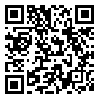Volume 8, Issue 2 (May 2021)
Avicenna J Neuro Psycho Physiology 2021, 8(2): 59-63 |
Back to browse issues page
Download citation:
BibTeX | RIS | EndNote | Medlars | ProCite | Reference Manager | RefWorks
Send citation to:



BibTeX | RIS | EndNote | Medlars | ProCite | Reference Manager | RefWorks
Send citation to:
Almasi A, Asadzadeh Dahraei H, Jahan F, Moazedian A. A Comparison of Rational-Emotional Approach and Strict Discipline Efficiency on Rational, Emotional, and Behavioral Skills among High School Students. Avicenna J Neuro Psycho Physiology 2021; 8 (2) :59-63
URL: http://ajnpp.umsha.ac.ir/article-1-243-en.html
URL: http://ajnpp.umsha.ac.ir/article-1-243-en.html
1- Ph.D. Student, Department of Psychology, Semnan Branch, Islamic Azad University, Semnan, Iran
2- Associate Professor, Department of Educational Psychology, Faculty of Psychology and Education, Allameh Tabataba'i University, Tehran, Iran , Asadzadeh@atu.ac.ir
3- Assistant Professor, Department of Psychology, Semnan Branch, Islamic Azad University, Semnan, Iran
2- Associate Professor, Department of Educational Psychology, Faculty of Psychology and Education, Allameh Tabataba'i University, Tehran, Iran , Asadzadeh@atu.ac.ir
3- Assistant Professor, Department of Psychology, Semnan Branch, Islamic Azad University, Semnan, Iran
Abstract: (1417 Views)
Background and Aim: Rational, emotional, and behavioral skills include self-awareness, as well as critical and creative thinking, which assist individuals in acquiring a deeper understanding of their personality, weaknesses, strengths, emotions, values, and identity. The present research aimed to compare the effect of the rational-emotional theory and strict discipline on rational, emotional, and behavioral skills among high school second-grade students.
Materials and Methods: The current study was conducted based on a pre and post-test design on three groups, including one control and two test groups. The statistical population consisted of 90 male second-grade high school students in Tehran during 2019-2020. The G*Power software was used to calculate the sample size. A number of 75 second-grade students were recruited for this study via the convenient sampling method. After that, the participants were assigned to three groups of 25 students. A self-made questionnaire of life skills, similar to Saatchi, Kamkar, and Askarian, was employed for data collection. Fifteen experts in curriculum planning confirmed the internal and external validity of the questionnaire. Moreover, its reliability was confirmed, rendering a Cronbach's alpha coefficient of 0.92. The data were analyzed in SPSS software (version 21) using multi-variant analysis of the covariance and Scheffe's Post Hoc test.
Results: Based on the results, the rational-emotional method had a more significant effect on students' rational (F=11.56, P<0.001), emotional (F=20.33, P<0.001), and behavioral skills (F=16.67, P<0.001), compared to the strict discipline.
Conclusion: It can be concluded that life skill training through rational-emotional theory brings about a marked increase in students' rational, behavioral, and emotional skills. Nevertheless, the strict discipline method revealed no significant association between training students on life skills and increased rational, behavioral, and emotional skills.
Materials and Methods: The current study was conducted based on a pre and post-test design on three groups, including one control and two test groups. The statistical population consisted of 90 male second-grade high school students in Tehran during 2019-2020. The G*Power software was used to calculate the sample size. A number of 75 second-grade students were recruited for this study via the convenient sampling method. After that, the participants were assigned to three groups of 25 students. A self-made questionnaire of life skills, similar to Saatchi, Kamkar, and Askarian, was employed for data collection. Fifteen experts in curriculum planning confirmed the internal and external validity of the questionnaire. Moreover, its reliability was confirmed, rendering a Cronbach's alpha coefficient of 0.92. The data were analyzed in SPSS software (version 21) using multi-variant analysis of the covariance and Scheffe's Post Hoc test.
Results: Based on the results, the rational-emotional method had a more significant effect on students' rational (F=11.56, P<0.001), emotional (F=20.33, P<0.001), and behavioral skills (F=16.67, P<0.001), compared to the strict discipline.
Conclusion: It can be concluded that life skill training through rational-emotional theory brings about a marked increase in students' rational, behavioral, and emotional skills. Nevertheless, the strict discipline method revealed no significant association between training students on life skills and increased rational, behavioral, and emotional skills.
Article Type: Research Article |
Subject:
General
Received: 2020/03/15 | Accepted: 2020/08/5 | Published: 2021/05/20
Received: 2020/03/15 | Accepted: 2020/08/5 | Published: 2021/05/20
Send email to the article author
| Rights and permissions | |
 |
This work is licensed under a Creative Commons Attribution-NonCommercial 4.0 International License. |







